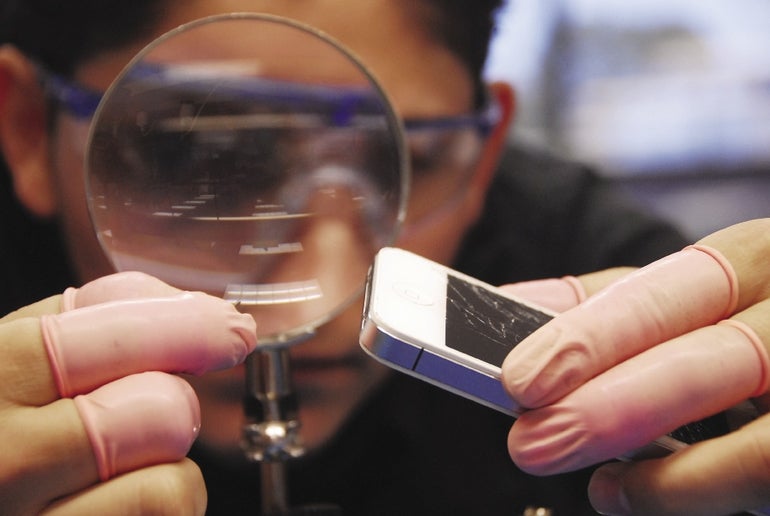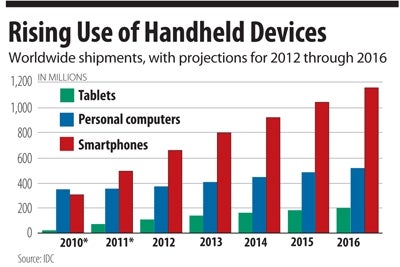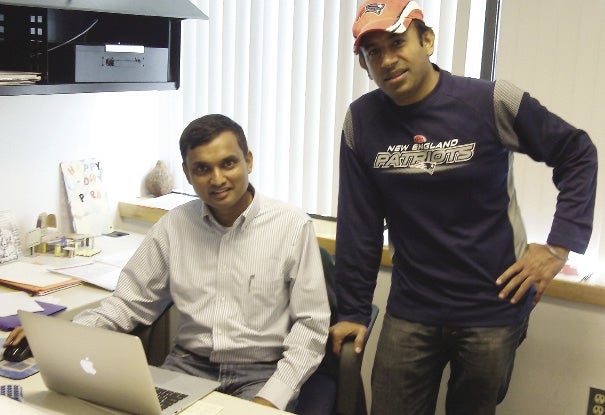Growing Smartphone Ecosystem Creates New Jobs, Ventures
Apple unveiled its iPhone 5 last month, and it's sure to make a bundle from its latest gadget.
But forget about the $108-billion tech giant and its various competitors for just a moment, and turn your attention to a fast-growing Central Massachusetts ecosystem that has quickly sprung up because of the smartphone.
Companies have shifted their focus or have formed entirely because of the increasingly popular gadget.
The firms run the gamut from mobile media to mobile advertising, enterprise software makers, programmers and refurbishers. There's no definitive count of how many jobs the mobile industry has created in Central Massachusetts, but judging from U.S. Census data on computer programmers, software developers and other roles, a conservative estimate puts it in the thousands.
The security, software and advertising spaces are all well represented in the region, as are refurbishers. And as they will all tell you today, just five years after the launch of the first iPhone, the industry has developed at a lightning pace.
Rapid Adoption
Though the original iPhone launched in 2007, smartphones quickly went mainstream; half of Americans own one, and that's projected to keep growing.
Smartphones have been adopted at 10 times the rate of personal computers in the 1980s, twice as fast as the web in the 1990s and three times as fast as social networking, according to a recent report from research firm Flurry Analytics.
And 77 percent of people worldwide are using their smartphones for both personal and work tasks, according to a recent survey by Framingham-based IDG.
Matt Yorke, president of IDG Strategic Marketing Services, said his own experience matches up.
"For me, it's almost impossible to have a meeting and not see a row of tablets in front of me," he said.
And one would have to wrack his brain to imagine a device more personal than a smartphone, he added.
"It sits by my bed, it's the alarm clock, it's the last thing I see at night and the first thing I see in the morning," he said.
And he's probably not alone. All those signs, Yorke said, point to a steady march toward a "truly mobile society."
Opportunity Knocks (Or Rings)
With people spending so much time on the devices, business opportunities are everywhere.
Take Marlborough-based Copiun, for example. The company, which was recently acquired by California-based Good Technology, makes enterprise file-sharing software for mobile devices. It was founded in 2008, as smartphones were just starting to take hold.
"Even at that point, there was a keen understanding that the endpoints were going to become more and more powerful and the users are going to want more and more powerful applications," said Puneesh Chaudhry, CEO and co-founder.
The company's understanding turned out to be spot on. And its TrustedShare file-sharing product, which lets employers secure work documents their employees are sharing and crafting on their own phones and tablets, drew Good's attention.
The biggest benefit for users, Chaudhry said, is productivity. The marriage of Copiun and Good will combine Copiun's documents capability with Good's corporate applications in one product.
"I randomly meet people in Starbucks saying 'I'm actually running my entire operation through my iPhone through a public connection, and it's all secure," he said. "It wasn't possible back then."
Moving forward, he believes the device itself will become less important as the applications and data become more powerful and elegant.
"We see these apps that are very intelligent. Mobile users are used to Angry Birds and Facebook and LinkedIn and they want the same level of productivity on the business side," he said.
Play As Important As Work
Another piece of the smartphone ecosystem that has quickly developed is games and apps. The app economy has created more than a half-million jobs in the United States, according to the Washington, D.C.-based Wireless Association. Massachusetts has more jobs in the sector as a percentage of total jobs than all but two of the 50 states, the association said.
Evidence of a hopeful future for mobile gaming can be found in Worcester at Becker College's Massachusetts Digital Games Institute (MassDiGI), launched last year.
Indeed games, said MassDiGi director Timothy Loew, are in many ways driving the mobile economy.
"For all intents and purposes, the number one product that makes money on any one of the smartphones (is) games," Loew said. "It's been a very disruptive force and it's opened up incredible opportunities."
Developers haven't missed the opportunity. Between the Apple and Android marketplaces, there are roughly 1 million apps, which include games, according to the Entertainment Software Association, which notes a PricewaterhouseCoopers estimate that the global wireless games market will reach $12.7 billion by 2014.
How that growing market will ultimately shake out is still unknown, Loew said. The fact that there are so many games makes it hard for many developers to get any visibility for them, something he calls "a discoverability problem."
The advantage may end up going to major developers like EA Entertainment and Activision, who have the deep pockets they need to market themselves, he said.
When Westborough-based Chitika was founded in 2003, its founder, Venkat Kolluri, saw consumers migrating to the Internet, where his company built an advertising network.
When the shift to mobile started to happen, Chitika's next move seemed obvious: It had to follow the eyeballs.
"In the end, advertisers want to be where users are," Kolluri said. "We saw the early indications of this and we started aggressively making plans."
Now, Chitika offers both web advertising as well as mobile options in its network.
"There's been a shift from 'It's a nice-to-have feature in marketing' to 'The first question is: What we can do on the mobile side first?' " he said.
Mobile has brought about one major change to advertising, the value of which Kolluri said cannot be understated: location tracking.
"Search keyword was a gift from God to online marketers on the web, and in mobile we've noticed the second greatest gift from God is location," he said. "If you know what the person is looking for and if you know where the person is, that lets us put local businesses, local promotions and local offers in front of users," he said.
And let's not forget, he added, smartphones are phones. Kolluri said another idea that could catch on is the creation of a payment model in which businesses pay for phone calls generated through their mobile ads.
"It's pay-per-click online. How about pay per call?" he said.
Though there are indeed more eyeballs on mobile screens today, something interesting has happened: Ad spending has not yet caught up. IDG notes that only 1 percent of ad spending is for mobile advertising.
Matt Kojalo, whom Chitika hired this year to lead its mobile division, said that number should be higher, but he has theories about why that's the case.
The situation continues to improve, but advertisers aren't yet entirely sure how to measure the return on investment for mobile ads, he said. Mobile offers a different experience from the PC, and advertisers need to find ways to make the ad experience different too.
"It's really getting those advertisers to build their 'post-click' experience and get it all together," he said.
Many smartphone users may not realize that their warranty replacement phone is actually a refurbished item, said Jeff Yasick, vice president of sales at Paragon R3 in Bolton.
"I don't know if it's hush-hush, but no one talks about it in the industry," Yasick said.
But Paragon R3 is doing plenty of business because of it.
Traditionally a refurbisher of enterprise telephone and networking systems, R3 parent company Paragon Communications officially stepped into the consumer electronics space last year when it formed R3.
Yasick said the approximately 20 employees at R3 take in old or damaged phones from major cell phone carriers or manufacturers, and restore them to like-new condition. Data from the former user is erased and old parts like the screen or internal pieces are replaced with new parts.
R3 also refurbishes old flip phones for the federal government's Lifeline program, which provides discounted or free phones to low-income users.
"There's a lot of business there," he said.
Correction: The original version of this story incorrectly characterized the geographic scope of an IDG survey, which found that 77 percent of smartphone owners use the devices for both work and personal reasons. The survey was done worldwide.
Read more
Why You Need A Mobile Device Policy
Digital Gaming Becomes A Serious Business
Central Mass. Banks Learn Value Of Social Media
















0 Comments